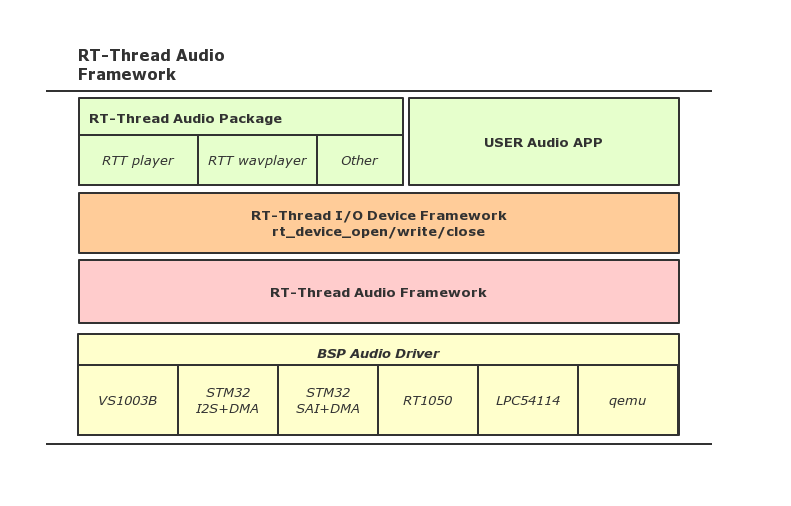RT-Thread Audio Framework Introduction-1
Created at 2020-12-10 22:17:48
Forwarded from RT-Thread Community Developer liu2guang
1. RT-Thread Audio Framework

2. RT-Thread Audio Application Code Template (Take example of wavplay)
https://github.com/RT-Thread-packages/wavplayer
3. RT-Thread Audio Driver Code Template
\#include "drv_sound.h"
\#include "drv_tina.h"
\#include "drivers/audio.h"
\#define DBG_TAG "drv_sound"
\#define DBG_LVL DBG_LOG
\#define DBG_COLOR
\#include
\#define TX_DMA_FIFO_SIZE (2048)
struct temp_sound
{
struct rt_audio_device device;
struct rt_audio_configure replay_config;
int volume;
rt_uint8_t *tx_fifo;
};
static rt_err_t getcaps(struct rt_audio_device *audio, struct rt_audio_caps *caps)
{
struct temp_sound *sound = RT_NULL;
RT_ASSERT(audio != RT_NULL);
sound = (struct temp_sound *)audio->parent.user_data; (void)sound;
return RT_EOK;
}
static rt_err_t configure(struct rt_audio_device *audio, struct rt_audio_caps *caps)
{
struct temp_sound *sound = RT_NULL;
RT_ASSERT(audio != RT_NULL);
sound = (struct temp_sound *)audio->parent.user_data; (void)sound;
return RT_EOK;
}
static rt_err_t init(struct rt_audio_device *audio)
{
struct temp_sound *sound = RT_NULL;
RT_ASSERT(audio != RT_NULL);
sound = (struct temp_sound *)audio->parent.user_data; (void)sound;
return RT_EOK;
}
static rt_err_t start(struct rt_audio_device *audio, int stream)
{
struct temp_sound *sound = RT_NULL;
RT_ASSERT(audio != RT_NULL);
sound = (struct temp_sound *)audio->parent.user_data; (void)sound;
return RT_EOK;
}
static rt_err_t stop(struct rt_audio_device *audio, int stream)
{
struct temp_sound *sound = RT_NULL;
RT_ASSERT(audio != RT_NULL);
sound = (struct temp_sound *)audio->parent.user_data; (void)sound;
return RT_EOK;
}
rt_size_t transmit(struct rt_audio_device *audio, const void *writeBuf, void *readBuf, rt_size_t size)
{
struct temp_sound *sound = RT_NULL;
RT_ASSERT(audio != RT_NULL);
sound = (struct temp_sound *)audio->parent.user_data; (void)sound;
return size;
}
static void buffer_info(struct rt_audio_device *audio, struct rt_audio_buf_info *info)
{
struct temp_sound *sound = RT_NULL;
RT_ASSERT(audio != RT_NULL);
sound = (struct temp_sound *)audio->parent.user_data;
/**
\* TX_FIFO
\* +----------------+----------------+
\* | block1 | block2 |
\* +----------------+----------------+
\* \ block_size /
*/
info->buffer = sound->tx_fifo;
info->total_size = TX_DMA_FIFO_SIZE;
info->block_size = TX_DMA_FIFO_SIZE / 2;
info->block_count = 2;
}
static struct rt_audio_ops ops =
{
.getcaps = getcaps,
.configure = configure,
.init = init,
.start = start,
.stop = stop,
.transmit = transmit,
.buffer_info = buffer_info,
};
static int rt_hw_sound_init(void)
{
rt_uint8_t *tx_fifo = RT_NULL;
static struct temp_sound sound = {0};
/* Assign DMA Move buffer */
tx_fifo = rt_calloc(1, TX_DMA_FIFO_SIZE);
if(tx_fifo == RT_NULL)
{
return -RT_ENOMEM;
}
sound.tx_fifo = tx_fifo;
/* Register the sound card sound driver */
sound.device.ops = &ops;
rt_audio_register(&sound.device, "sound0", RT_DEVICE_FLAG_WRONLY, &sound);
return RT_EOK;
}
INIT_DEVICE_EXPORT(rt_hw_sound_init);
Follower
0
Views
1.5k

